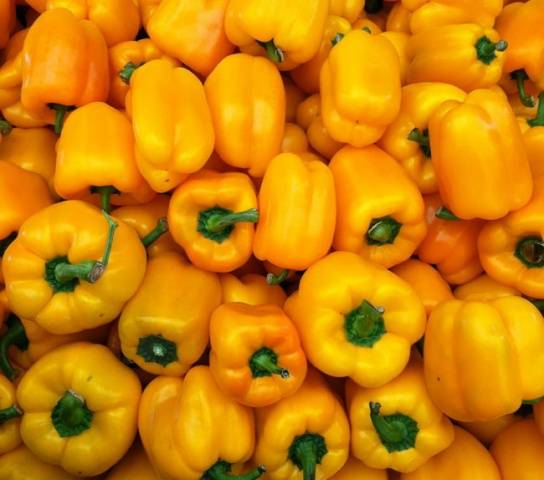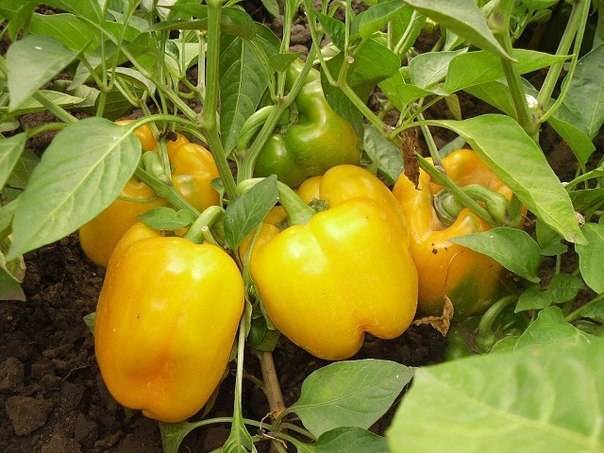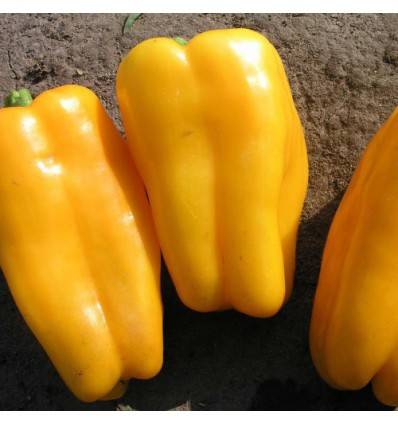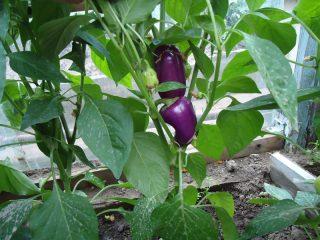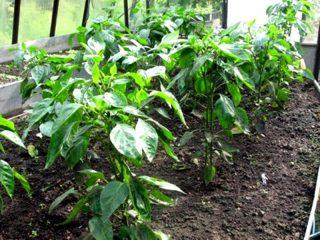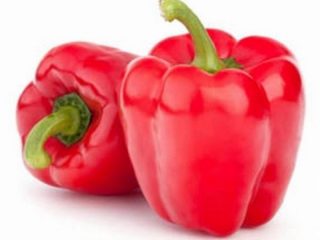A huge number of different seeds of sweet bell pepper allows each farmer to choose the best variety for himself, corresponding to taste and aesthetic preferences. At the same time, there are a series of varieties with similar agrotechnical characteristics and taste qualities of fruits, but their different colors. For example, the so-called bulls are represented by peppers red and yellow. Among other yellow-fruited varieties, the Yellow Bull pepper is distinguished by an especially large, sweet fruit, high yield and other advantages, which will be discussed in this article.
Taste and external qualities of pepper
The Yellow Bull is a hybrid. It was obtained by domestic breeders by crossing two varieties of pepper. The "visiting card" of the variety is a huge fruit: the length of the vegetable reaches 20 cm, cross-sectional diameter is 8 cm. The flesh of the "Yellow Bull" is very thick - 10 mm. The average weight of a vegetable varies from 200 to 250 g. Especially large fruits can weigh up to 400 g. Their skin is thin, delicate, glossy surface. The vegetable has the shape of a truncated cone, with three to four distinct edges and a depressed stalk. During the growth period, the fruits are colored green, and upon reaching technical ripeness, their color becomes golden yellow.
The taste of the vegetable is excellent: the thick pulp has exceptional tenderness, juiciness, sweetness. The amazing fresh aroma of pepper will surely be remembered by everyone who has tasted it at least once. The purpose of the fetus is universal. It is consumed fresh, canned, used to create culinary masterpieces.
Agrotechnics
The “Yellow Bull” hybrid is distinguished by its thermophilicity, therefore it is zoned for the southern and central regions of Russia. However, based on the experience of farmers, it can be argued that the variety bears excellent fruit even in more severe climatic conditions in the presence of a greenhouse, greenhouse. When growing crops in open areas, it is necessary to ensure maximum illumination and protection of plants from the wind.
The period from sowing seeds of the "Yellow Bull" variety to abundant fruiting is 110-125 days. Given this ripening time, the best time to sow seedlings can be calculated. In the middle climatic zone, it occurs in March. Seedlings at the age of 2 months will need to be planted in the ground. Mass harvesting with such a cultivation schedule can be carried out in July. The first fruits can be tasted 1-2 weeks earlier.
Pepper variety "Yellow Bull" can be grown in open areas and under a film shelter, in greenhouses, greenhouses. The soil favorable for cultivation is sandy-clayey, nutritious, with a high organic content.
The variety is represented by vigorous bushes up to 1.5 m high.The recommended scheme for their cultivation involves placing no more than 4 bushes per 1 m2 soil. Plants of the "Yellow Bull" variety must be tied up. It is best to use a trellis for this. In the process of growth, it is imperative to form a pepper bush, removing the lower and overgrown shoots.
Mandatory plant care includes regular watering, loosening, weeding. It is recommended to fertilize the peppers during the cultivation process every 3 weeks, adding fertilizing with nitrogen, phosphorus and potassium. There is no need to treat the yellow bull pepper bushes with chemicals that resist various diseases, since the culture is genetically protected from most specific ailments.You can learn more about the features of caring for crops in open and protected ground from the video:
The yellow-fruited variety abundantly forms ovaries until the onset of cold weather, which allows achieving high yields. So, when growing peppers in open areas, the yield of the variety is approximately 7-9 kg / m2, however, in greenhouse conditions or when using a heated greenhouse, this figure can increase to 20 kg / m2.
"Yellow Bull" is one of the most demanded varieties among professional farmers, as it allows you to get a record yield for a crop of fruits of high taste and external quality. At the same time, long-term storage and transportation of peppers does not affect their presentation. Among novice gardeners, the variety is also loved, since it does not require compliance with complex cultivation rules and allows you to easily get a rich harvest of delicious, beautiful peppers.
